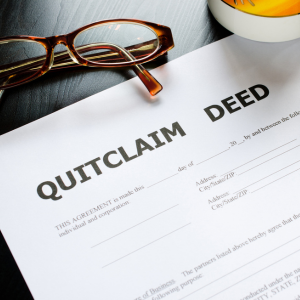
What is a Quitclaim Deed?
Definition and Purpose of a Quitclaim Deed

A quitclaim deed is a legal document used in real estate to transfer property ownership. It involves two parties: the grantor, who transfers interest, and the grantee, who receives it. Unlike other deeds, a quitclaim deed does not guarantee that the grantor has a clear title to the property. It simply transfers whatever interest the grantor may have. This type of deed is commonly used between family members or in cases like marriage or divorce, where there is no monetary exchange.
When to Use a Quitclaim Deed in North Carolina
In North Carolina, a quitclaim deed is generally used for property transfers among close family members, such as between spouses during marriage or divorce settlements. It can also be employed when correcting previously filed deeds. The legal requirements are straightforward, but you should ensure that all transactions comply with state laws. Consulting a legal professional can help determine if a quitclaim deed suits your situation.
Are There Risks Associated with Quitclaim Deeds?
Potential Risks for the Grantor

For the grantor, a quitclaim deed carries some risks. The main risk is that the grantor does not warrant the property’s title. This means there is no assurance against existing liens or encumbrances on the property. Before signing a quitclaim deed, the grantor should seek legal advice to fully understand the potential implications and confirm no unresolved title issues.
Considerations for the Grantee
The grantee, or recipient of the property via a quitclaim deed, should proceed with caution. Unlike warranty deeds, quitclaim deeds do not protect against title defects or unexpected claims from third parties. To reduce these risks, obtaining title insurance is wise. Title insurance protects against undisclosed title issues and disputes arising after the property transfer, safeguarding the grantee’s ownership rights.
Grantors and grantees can handle property transfers more effectively by understanding how quitclaim deeds work and recognizing the associated risks. Wake County Home Buyers suggests consulting a qualified real estate attorney to ensure all process aspects are properly managed.
How Does a Quitclaim Deed Differ from Other Deed Types?
A quitclaim deed is one way to transfer property ownership. Unlike a warranty deed, it does not promise the title is clear. The grantor gives their interest in the property but does not ensure any title issues. This makes it less secure than warranty deeds but useful in some cases.
Comparison with Warranty Deeds

Consider the protection each offers when comparing a quitclaim deed to a warranty deed. A warranty deed ensures the grantor has a good title and protects the grantee against future claims. A quitclaim deed doesn’t offer these guarantees, so it’s important to understand the risks involved in the transfer. Knowing real estate law and deed forms helps make informed decisions about property transactions.
Situations Where Quitclaim Deeds are Preferable
Quitclaim deeds work well in certain situations. They’re often used in family transfers where trust exists between parties. They’re also applied in estate planning, like in North Carolina, where family property transfers are common. In divorces, they help transfer property from one spouse to another. Getting legal advice to ensure the transfer meets your goals and follows local rules is wise.
Who Can Prepare a Quitclaim Deed in North Carolina?
In North Carolina, preparing a quitclaim deed requires knowing the legal requirements. The grantor and grantee must complete the property documents and meet state rules. While you can prepare your quitclaim deed, consulting a real estate attorney helps ensure accuracy and compliance with legal standards.
Legal Requirements for Preparing a Quitclaim Deed

Creating a quitclaim deed in North Carolina involves several legal steps. The grantor and grantee must be identified properly, the deed form must be filled out correctly, and the document recording process must be followed. These steps are important to ensure a smooth transfer and protect everyone’s interests. Presenting accurate information prevents future disputes over property ownership.
The Role of an Attorney in the Process
An attorney is crucial in preparing and reviewing a quitclaim deed. They provide legal advice and guidance to ensure the deed satisfies all legal standards. In North Carolina, an attorney helps navigate complex real estate laws and protects property rights. Their expertise results in a legally sound transfer, providing the grantor and grantee with peace of mind.
What Information is Required on a Quitclaim Deed Form?
A quitclaim deed is a legal document that transfers property ownership from one party to another, typically without warranties. Essential details included on a quitclaim deed form involve several vital components:
- Grantor and Grantee Information: The grantor is the individual or entity transferring the property, while the grantee is the recipient. Their full legal names and addresses should be provided.
- Property Description: A precise description of the property being transferred is necessary. This includes legal identification, often listing the property’s lot number, block number, and subdivision name. Accurate property descriptions help avoid future disputes over boundaries or ownership.
- Consideration: This section specifies what the grantee provides in return for the property, which can be monetary or nominal.
- Date of Transfer: Specify the date the ownership transfer is intended to occur.
- Legal Identification: Include any title numbers or identifying factors as recorded in the local registry to ensure the correct property is identified.
Completing a quitclaim deed accurately is crucial, especially in North Carolina, where specific statutory requirements apply. Errors or omissions could cause legal issues or delays.
How is the Quitclaim Deed Notarized?
To make a quitclaim deed legally binding, it must be notarized. The notarization process involves several key components:

- Signature Verification: The grantor must sign the quitclaim deed in the presence of a notary public, confirming the signature’s authenticity and the intent to transfer the property.
- Notary’s Role: The notary public verifies the grantor’s identity, typically by checking a government-issued ID before witnessing the document’s signing.
- Notarization Process: After verifying the identification and witnessing the signature, the notary affixes their seal or stamp to the document. This act officially acknowledges that the signature was genuine and made willingly.
- Avoiding Errors: All fields should be properly completed before presenting the document for notarization to prevent errors that could invalidate the deed.
- Local Regulations: In North Carolina, specific guidelines govern the notarization process, including the format of the notary’s acknowledgment. Compliance with these rules is necessary for the document’s acceptance.
Once notarized, the quitclaim deed should be recorded with the appropriate county office, such as the Register of Deeds, to complete the property transfer officially.
Where Should You File Your Quitclaim Deed in North Carolina?
When filing a quitclaim deed in North Carolina, you must find the correct Register of Deeds office. Each North Carolina county has its own Register of Deeds, which is responsible for recording property records and handling property transfers. Identifying the right office is crucial for the process.
Identifying the Correct Register of Deeds Office

To file a quitclaim deed correctly, locate the Register of Deeds office for the county where the property is located. This ensures the deed is recorded correctly, which is important for the property’s legal transfer. Check the office’s website or contact them directly for guidance on filing location and requirements.
Understanding County-Specific Filing Requirements
Filing a quitclaim deed means you must follow specific requirements for each county. These may include different processes, interpretations of real estate law, and documentation needed for processing the deed legally. Each North Carolina county may have unique rules, so understanding these details is important for a smooth filing.
What Fees Are Involved in Filing a Quitclaim Deed?
Filing a quitclaim deed in North Carolina incurs several costs. The Register of Deeds sets these fees, which can vary by county.
Overview of Typical Filing Fees

The Register of Deeds typically charges filing fees for processing documents. These fees vary by county in North Carolina and depend on the number of pages. It’s best to check their fee structure with the specific county’s Register of Deeds office.
Additional Costs You Might Incur
Beyond basic filing fees, other costs may arise during the quitclaim deed process. These can include:
- Legal Fees: If you need legal help to prepare or review the deed.
- Notary Costs: These are for notarizing documents as part of the filing.
- Administrative Charges: Any extra charges by the Register of Deeds for services like expedited processing.
These costs can add up, so plan for them as part of your real estate transaction. Awareness of these potential expenses helps ensure a smoother property transfer process in North Carolina.
How Long Does It Take for a Quitclaim Deed to be Processed?
In North Carolina, the time it takes for a quit claim deed to be processed can differ due to several factors. Once submitted to the register of deeds, the document goes into a queue for review and recording. This process generally takes from a few days to a few weeks. Preparing all necessary paperwork accurately helps avoid delays.
Expected Timelines for Processing and Recording
The timeline for processing and recording a quit claim deed in North Carolina depends largely on the workload at the register of deeds’ office. Usually, it takes one to three weeks for the property transfer to be officially recorded. Regular checks with the register of deeds ensure there are no unexpected delays.
Factors That May Impact Processing Time
Several elements can affect how long it takes to process a quit claim deed:
- Completeness of Documentation: Ensure all forms are filled out correctly.
- Register of Deeds Workload: High volumes can lead to longer processing times.
- Legal Requirements: Following local and state laws is crucial to prevent delays.
- Errors in Filing: Mistakes in paperwork can cause significant setbacks.
Being mindful of these factors can help speed up the quit claim deed process.
What Happens After Filing a Quitclaim Deed?

After you file a quit claim deed in North Carolina, it gets reviewed and recorded in the county’s land records. This recording updates property ownership details in public records. Verifying that the transfer is documented correctly is key to avoiding future disputes over property ownership.
Impact on Property Ownership and Records
Once a quit claim deed is recorded, official records update the property’s title and ownership. This change legally transfers ownership and affects the property’s appearance in public documents. Proper documentation of this transfer establishes the new owner’s rights and responsibilities over the real estate.
Steps to Verify the Recording of the Deed
To confirm that a quit claim deed has been recorded in North Carolina, follow these steps:
- Contact the Register of Deeds: Inquire about the status of your deed recording.
- Request a Copy: Obtain a certified copy of the recorded deed.
- Review Public Records: Check online databases or visit the Register of Deeds office for verification.
- Consult Legal Advice: If discrepancies arise, seek help from a legal professional.
Following these steps ensures the accuracy and completion of the deed recording process.
This information applies to North Carolina and its cities, including Greensboro, Fayetteville, and Raleigh. For assistance or questions, please call us at (919) 473-6885 . You can also visit our website at Wake County Home Buyers for more details
FAQs:
What is a quitclaim deed and how does it work in North Carolina?
A quitclaim deed is a legal document used to transfer ownership rights in property without guarantees. In North Carolina, you fill out the right form, get it notarized, and file it with the county register of deeds. Be sure all parties understand this deed doesn’t guarantee a clear title.
Where can I get a quitclaim deed form in North Carolina?
You can get a quitclaim deed form from online legal sites or at the county register of deeds office. Ensure the form meets North Carolina’s requirements and includes all necessary details to avoid legal issues.
Can a quitclaim deed be used during divorce proceedings in North Carolina?
Yes, a quitclaim deed can transfer property rights between spouses during a divorce in North Carolina. It helps redistribute property ownership as agreed in the divorce. It’s wise to consult a lawyer to cover all legal aspects.
Is notarization required to file a quitclaim deed in North Carolina?
Yes, notarization is required in North Carolina. A notary public must witness the signing to confirm the identities of the parties involved and ensure the legal transaction.
What are the tax implications of filing a quitclaim deed in North Carolina?
Filing a quitclaim deed may not have direct tax consequences, but it’s best to consult a tax professional. They can explain potential taxes, such as capital gains or gift tax, based on the property’s value and other factors.
How long does it take to process a quitclaim deed in North Carolina?
Processing times vary by county. After notarization and filing with the county register of deeds, it usually takes several days to weeks for the deed to be recorded officially.
Can multiple owners file a quitclaim deed together in North Carolina?
Multiple owners can execute a quitclaim deed to transfer their property interests. All parties must sign and notarize the deed before filing it with the county.
What should I do if there is an error in my quitclaim deed in North Carolina?
If there’s an error, you may need to file a corrective deed. This involves similar steps to the original: filling out the form, getting it notarized, and submitting it to the county register of deeds. Legal advice can help ensure you correct it properly.
Key Insights
- Understand the process of filing a quitclaim deed in North Carolina, including how to fill out the correct forms and where to file them.
- Learn about the steps for recording a quitclaim deed in NC, such as notarization and witness requirements specific to each county.
- Review the witness requirements for NC quitclaim deeds to ensure your documents meet all local legal standards.
- Explore options for a North Carolina property deed change, including steps for a quick claim deed and beneficiary considerations.
- Get guidance on handling the North Carolina quitclaim deed form, including verification and joint ownership nuances.
- Familiarize yourself with the process and timeline for quitclaim deed registration in North Carolina for efficient processing.
- Access resources for NC real property quitclaim procedures, including consultation and legal advice services.
- Examine the implications of quitclaim deeds in complex situations like Chapter 7 bankruptcy or when dealing with a life estate and survivorship rights.
- Use tools and services for e-signature, email notifications, and document management to streamline the deed transfer process.
- Stay informed about the costs, fees, and office requirements for filing and processing in North Carolina.


